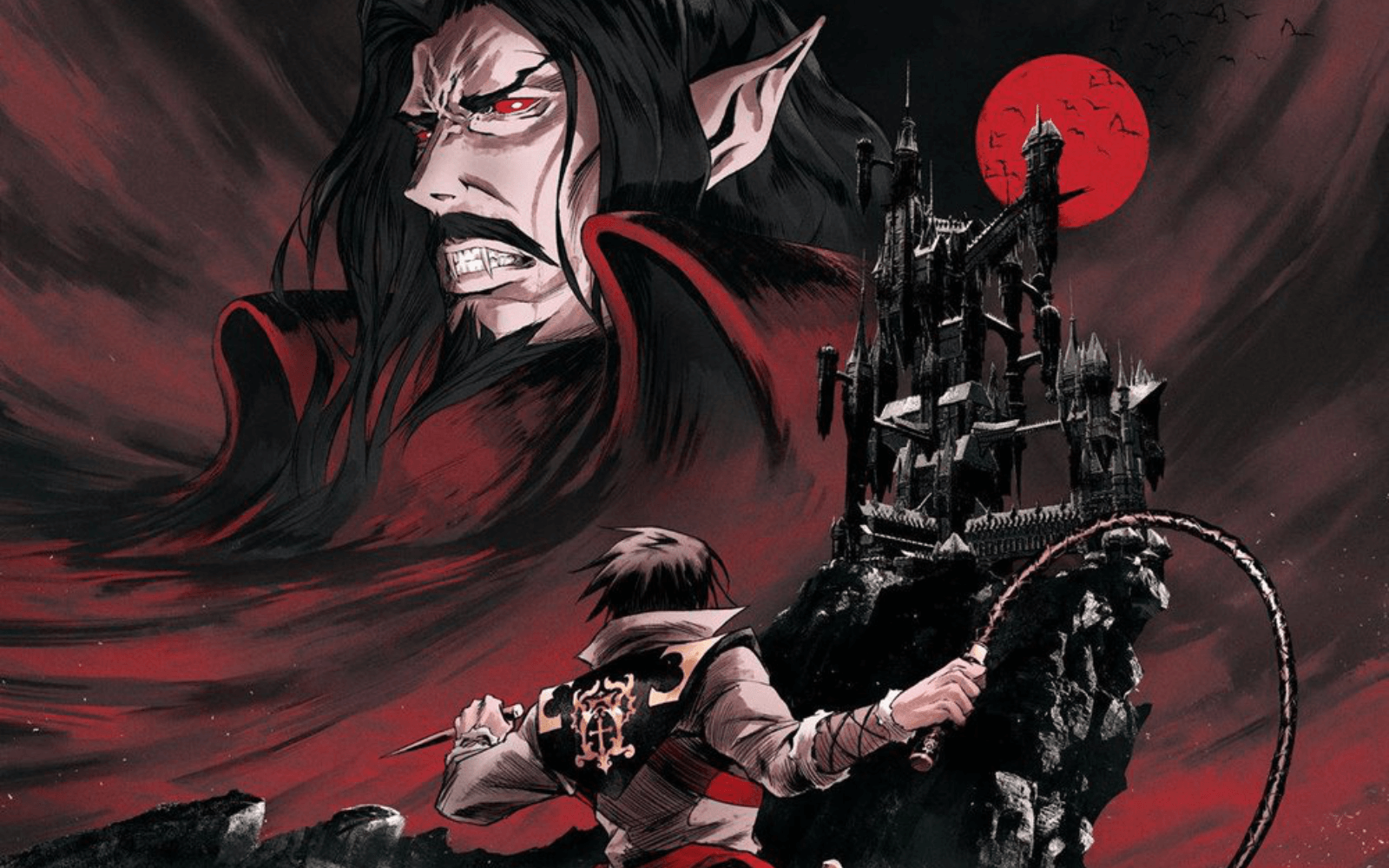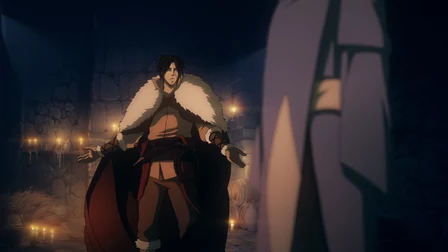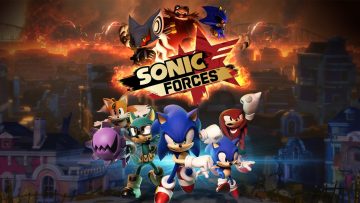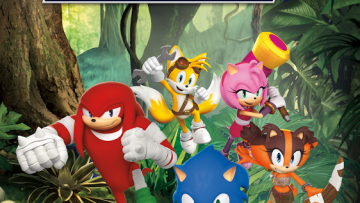
Review: Castlevania (Netflix Series) Season One

When it comes to TV and film adaptations of video games, there is no glowing poster child to point to.
The term “video game movie” is borderline pejorative, as countless mediocre-to-bad tie-in movies have conditioned us to collectively distrust the mere concept with Pavlovian automaticity. However, against all odds, a Netflix original series based on a long-dormant video game franchise has somehow managed to rise from development hell (ironically) and become the frontrunning contender for “the one that got it right.”
I write this article from what I’d consider a unique perspective among games media; I have never played a Castlevania game before. While that may mean nothing to a “core-gamer,” it means everything to the average layman scanning through Netflix’s “Because You Watched.” There hasn’t been a Castlevania game in years. This four-episode Netflix series is no doubt a first-time-Castlevania-experience for a lot of people. Video game movies/shows are often plagued by “you’d have to play the game to appreciate that” moments, and this series smartly avoids using any of those as an entry barrier. Castlevania does exactly what it needs to do by being a well-made television series that stands on two feet, even without prior knowledge of it’s parent game series.
That is not to say that Castlevania is unfaithful to its medieval vampire-hunting source material. Rather, the crowning achievement of the series in its ability to to stay faithful and throw in the easter eggs, while never alienating outsiders. It’s a tasteful balance. It never points at a reference and winks at the camera. At the same time, it is perfectly respectable to the world established in the video games (from what I’ve seen).
The story is solid and well-done. For whatever reason, a good story is usually the first thing that video game adaptations neglect, which is is unfortunate, as story is the most important ingredient in a narrative medium like film or television. It’s as if creators get so concerned with making a “video game movie” that they forget to make a good movie, at a fundamental level.

Not Castlevania! Every character has goals. Every scene informs/moves the plot in some way. And to keep all of that from sounding like a basic check list, it does it all very well and in a way that is engaging. Every time an episode ended, I wanted to watch the next.
The characters are usually handled well, with defined motivations and fat-free dialogue. Trevor Belmont (Richard Armitage) is an interesting character, though he is sometimes too lethargic for a lead protagonist. While his sarcasm can be charming, he can also be slightly unlikable. In fact, one could argue that the motivations of Dracula, the main villain, are more relatable than Trevor’s, who can sometimes feel like he’s acting out of obligation and not sincerity. Trevor seems to flip-flop, but when’s he on his good side, it’s effective.
Furthermore, the much more relatable and likable Sypha Belnades (Alejandra Reynoso), shares the spotlight with Trevor. She is the yang to his yin, and keeps the ship afloat by accentuating Trevor’s redeemable characteristics. She is carrying the torch for the also-likable Lisa Tepes (Emily Swallow), who is unfortunately only in the first episode. Lisa is a truly inspiring character, whose last words echo those of Christ himself with more accuracy than the corrupt Bishop of clergyman that succeed her.
“Was all that violence really necessary?” asks The Edler (Tony Amendola) in the second episode. Castlevania’s biggest flaw is its heavy reliance on the trite R-rated shock value “oh my gosh did he just rip his eyeball out?” brand of violence. At the risk of sounding like a grandma to blood-thirsty edgelords, the over-the-top violence feels heavy-handed and off-putting, especially in a game series that has more T-rated titles than anything (and for the record, more E-rated games than M-rated. And does that 2010 Castlevania: Lords of Shadow reboot even count here? This Netflix series is clearly drawing the majority of its influence from the original continuity, pre-2010, before longtime-producer Koji Igarashi left).
Subtlety is an utterly powerful tool in storytelling, and conversely, shock value is no substitute for substance. As an outsider looking in, it’s easy for me to point the finger of blame at the TV series’ producer, Adi Shankar. This is a man who is responsible for that cringy, tryhard, overly-dark, R-rated Power Rangers fan film from a few years back. Did I mention he likes to paint black triangles over his eyes with makeup, like he’s the dark gothic prince of early-2000’s adolescence?

While I will commend Shankar and the writers/directors for successfully adapting a video game to another medium, it’s sad to me that the adaptation came with unfortunate baggage that seems specific to this man’s creative signature. This becomes even more jarring when the last episode cuts away from a violent death. I kid you not, when a primary character gets his head eaten off by a demon in Episode 4, the camera pans down to his feet, leaving all the gore offscreen. It leaves you asking, “Why?” After severed heads, dead infants, and entrails sprawling out of corpses, why now? Nothing has stopped them before, so why the hesitance all of a sudden? It’s the only death in the whole first season that practices any sort of subtlety, easily making it the classiest death in the whole series, while simultaneously drawing attention to how shallow and “shock-rock” the rest of the violence is handled. I just hope the exaggerated grittiness doesn’t become the template for future video game adaptations, as it’s the storytelling that made this show a success, not the puddles of innards.
Alas, the series seems to be begin just as it ends. Taken as a whole, the series feels more like a movie split into four parts, rather than four standalone episodes with a loose through-line. As such, I can’t help but think that we’ve only scratched the surface of Castlevania, and it looks very promising. A successful video-game-to-film adaptation of any game franchise has been long overdue, and though I fear my desperation for one may be forcing me to exaggerate this series’ strengths and quality, it’s clear to me that Castlevania has done a good job. Well done.
Noah Copeland is a somewhat interesting human. He makes music, makes films, and stands at exactly average height. You can follow him on Twitter @NoahCopeland


![[ID: 2W22t1Isd2w] Youtube Automatic](https://lastminutecontinue.com/wp-content/uploads/id-2w22t1isd2w-youtube-automatic-60x60.jpg)




So how is this related to Sonic? I’m just asking is all
@Metadork it’s not. But that’s ok. The “beyond blue” part of TSSZ does include non-Sonic gaming news. We will are still Sonic-focused, but we do cover other things from time to time.
This is good, i like when you guys go “Beyond Blue” !!
Aw, thank you! XD
I liked this season alright, even if it felt like just a pilot, and I don’t mind the violence at all, it’s all too common on the Castlevania games and the eye popping scene actually sold me on the idea that a guy with a whip could be taken seriously as a warrior and vampire hunter.
But just as you said the biggest highlight of this show was the story, hope they keep it up in the upcoming seasons and that these will be the first steps to vanquish the curse of video-games adaptations.